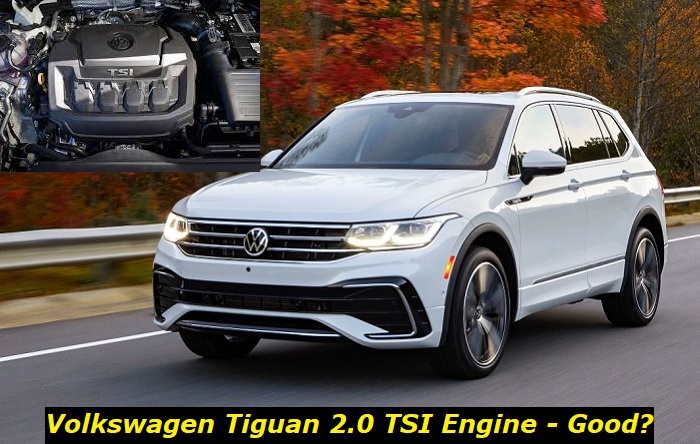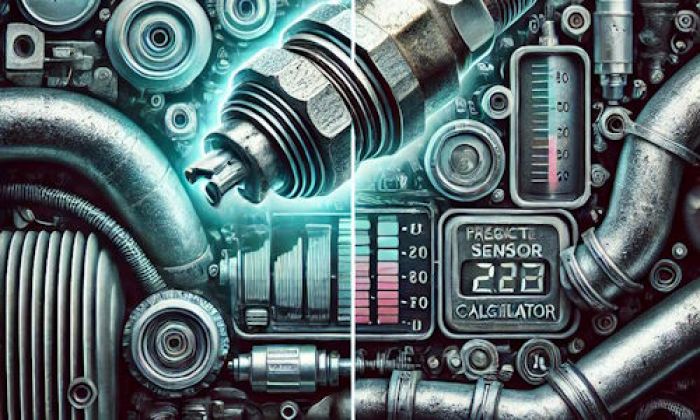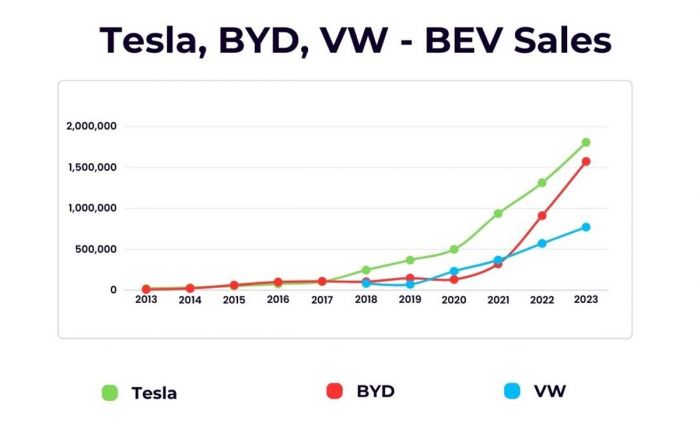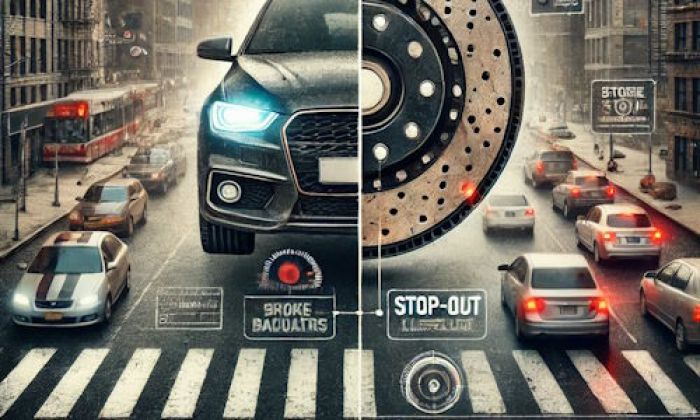If you look at the number of engines Volkswagen has engineered and manufactured within the decade, you'll be amazed. But identifying the engine under the hood of your car is not that easy. Yes, it may be the 2.0 TSI, for example, but there are literally dozens of versions and it's too hard for an average car owner to see the difference.
Today, we'll tell you more about the 2.0L engine that is installed in the Volkswagen Tiguan for the American market in 2023. We'll cover everything you need to know to decide whether you want to pay your money for this vehicle or not. The 2-liter turbocharged engine is not bad in terms of your feeling when you drive the car. But what surprises does it have in store for you?

Key features and my opinion about the engine
- Production years:2016-now
- Average lifespan of 2.0 TSI:160,000-180,000 miles
- Fuel supply type:combined injection (MPI + FSI)
- Power range:180-250 hp
- Fuel efficiency:good
- Engine block material:cast iron
- Engine reliability score:medium
- The most common problems:oil consumption is very typical, the timing chain isn't going to live forever, variable oil pump is weak, plastic water pump is weak.
Some facts to remember about the 2023 Tiguan 2.0L engine
So, the 2.0 TSI is actually the legendary engine that we all know. But under this name, Volkswagen has engineered and manufactured a lot of different engines. And in the new Tiguan, you will have one of the weakest versions of this powerplant with only 184 horsepower and 221 lb-ft of torque.
But don't make any fast conclusions. Low power and torque are not bad, in this case, because you get two wonderful advantages instead: great fuel economy and also better longevity than in more powerful 2.0 TSI engines. It means you will spend less money on repair and buying gasoline than you could spend on another engine.
Here are some key facts about the 2-liter engine in the new Tiguan:
- it's a turbocharged TSI engine with an aluminum head and cast-iron block, hydraulic valve lifters, phasers on both shafts, AVS;
- the engine has an unusual system of fuel injection consisting of two rows of injectors (MPI plus FSI), so the common problem of the direct injection system (carbon buildup) shouldn't bother you much;
- the turbocharger is IHI - a pretty simple and not very big turbo that is not really hard to repair and not very expensive to replace in case of trouble;
- the gas mileage is just unbelievable - 31 mpg on highways and about 24 mpg in the city which is cool for the SUV (for the front-wheel-drive version only);
- the only available transmission now is the 8-speed automatic transmission (thank you, VW, for banning those ugly DSG transmissions for the Tiguan!);
- all-wheel drive is optional in base trims and standard for higher trims, but we would choose the front-wheel-drive version for the sake of fuel economy.
So, the engine seems to be really good. It's very economical, not that problematic, and pretty durable, based on well-known technologies. It means you can drive this car for a long time and don't care about any expensive repairs and other problems that usually happen with Volkswagen cars. And this is a huge advantage of the new Tiguan.
The engine has no other alternative on the American market and is the only available option as well as the 8-speed transmission. So, even if you decide to pay $10,000 more than the cheapest S trim costs, you are not going to drive faster. And this is the very important feature that would make us go for the SE trim. It has everything you may need on the road and it's offered at a very decent price.
What's the lifespan of the 2.0 TSI engine in the new Tiguan?
This engine is not very fresh as it has been manufactured since 2016. And it's good because we know a lot of information and statistics about it now. We should say this is one of the best engines in the TSI family and it usually shows no problems that are common for other 2-liter engines in this group.
The average lifespan should be about 175,000 miles. It's not a lot if you compare it with an SUV made 20 years ago (that is able to hit a half-million-mile mark easily). But if you look at the modern market, you'll see that this is just the average expected mileage of the majority of other engines.
Well, yes, the longevity of the 2-liter TSI engine depends much on how you drive and maintain it, so we'll look at some important tips on how to prolong the life of the engine. Also, bear in mind that we are talking about the average lifespan, so there will be owners who will drive their Tiguan SUVs much longer and experience no major problems.
What are the common problems with the 2.0 TSI engine in the Tiguan?
We should say that the Tiguan in 2023 doesn't show many problems with the engine. This TSI powerplant is very good in terms of reliability and doesn't need a lot of maintenance. It makes the engine really good to own. Of course, you will still need to repair or replace some minor parts or have them repaired under warranty. But this is true for all vehicles in all price ranges.
Here are some of the most common problems you can need to deal with in your VW Tiguan 2.0 TSI engine:
1. Oil consumption
We've read reviews where owners wrote that their TSI engines in Tiguans started burning some oil from the very first day. Dealers usually say it's OK. But it's not OK. It means there is a problem in the engine like a defective valve seal or piston ring. It also means that the engine is not going to live long enough because the burning oil will contaminate everything in the head and the exhaust system.
If your Tiguan 2.0 TSI has this problem, go to the dealer and make them repair the issue or replace the engine under warranty.
2. Timing chain problems
This engine has a timing chain which is pretty good and durable. But at 100,000 miles or sooner you will have to replace this chain. And you'll be surprised that the chain costs a fortune. Along with the chain, the water pump should also be replaced as well as the tensioner and some other minor parts.
If the chain stretches and jumps a bit, it may lead to fatal engine damage. There is no need to wait for problems - just replace the chain and all other needed parts at 100K miles and drive another 75K miles with no problems.
3. Bad fuel problem
This engine is made to digest premium gasoline with high quality. If you use regular, the injection system will fail. After that, the catalytic converter will overheat and fail. This will lead to all emission control system issues which will cost you thousands of dollars to repair.
These problems you won't notice directly when you buy bad fuel. They will build up gradually and eventually come one after another. Even though you may feel that the behavior of the Tiguan doesn't change when you buy regular oil, never do this. It will lead to very expensive problems.
4. Turbocharger issues
Even though the turbocharger is much better than in other 2.0 TSI engines, it's still not eternal. At 100,000 miles, you will start noticing the first problems with the turbo. The engine may lose some power, it may feel sluggish or shake during acceleration.
The good thing once you notice these symptoms is to have the turbo checked. If the turbocharger is badly damaged, the best option is to replace it with a new one and forget about this problem. But we should say that the IHI turbocharger may also be rebuilt.
How should you drive your Tiguan 2.0 TSI to prolong its lifespan?
It's pretty hard to drive the new Tiguan longer than 175,000 miles. Hard but not impossible. You may follow these simple suggestions to avoid the premature death of the engine and minimize the number of problems you will have with it:
- always keep up with the recommended maintenance procedures;
- never try to economize money on oil, filters, and parts (OEM is the best choice);
- replace the timing belt at 100K miles;
- rebuild the turbocharger at 100K miles;
- forget about excessively aggressive driving;
- don't tow anything with your Tiguan;
- pay attention to any error messages and have the vehicle regularly diagnosed with the VW code scanner.
Final words
In most cases, the 2.0 TSI engine in the 2023 Volkswagen Tiguan will die because of negligence. While the vehicle is still new, owners tend to change oil and filters on time, have the vehicle diagnosed regularly, they even buy OEM parts. But after that, the vehicle loses its price and all those TLC things come to an end.
Better keep maintaining the TSI engine as it should be maintained. Otherwise, it will break quickly and require a very expensive repair or even replacement.
About the authors
The CarAraC research team is composed of seasoned auto mechanics and automotive industry professionals, including individuals with advanced degrees and certifications in their field. Our team members boast prestigious credentials, reflecting their extensive knowledge and skills. These qualifications include: IMI: Institute of the Motor Industry, ASE-Certified Master Automobile Technicians; Coventry University, Graduate of MA in Automotive Journalism; Politecnico di Torino, Italy, MS Automotive Engineering; Ss. Cyril and Methodius University in Skopje, Mechanical University in Skopje; TOC Automotive College; DHA Suffa University, Department of Mechanical Engineering






Add comment